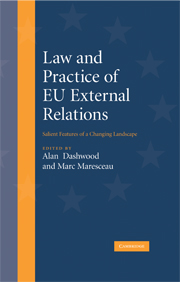Book contents
- Frontmatter
- Contents
- Abbreviations
- Notes on contributors
- Acknowledgements
- Introduction
- PART I Constitutional and institutional questions
- 1 Direct effect and interpretation of international agreements in the recent case law of the European Court of Justice
- 2 Defining competence in EU external relations: lessons from the Treaty reform process
- 3 Article 47 TEU and the relationship between first and second pillar competences
- 4 EC law and UN Security Council Resolutions – in search of the right fit
- 5 Fundamental rights and the interface between second and third pillar
- 6 The EU as a party to international agreements: shared competences, mixed responsibilities
- 7 The Common Commercial Policy enhanced by the Reform Treaty of Lisbon?
- 8 The extent to which the EC legislature takes account of WTO obligations: jousting lessons from the European Parliament
- PART II Bilateral and regional approaches
- PART III Selected substantive areas
- Table of Treaty Provisions
- Index
5 - Fundamental rights and the interface between second and third pillar
from PART I - Constitutional and institutional questions
Published online by Cambridge University Press: 07 September 2009
- Frontmatter
- Contents
- Abbreviations
- Notes on contributors
- Acknowledgements
- Introduction
- PART I Constitutional and institutional questions
- 1 Direct effect and interpretation of international agreements in the recent case law of the European Court of Justice
- 2 Defining competence in EU external relations: lessons from the Treaty reform process
- 3 Article 47 TEU and the relationship between first and second pillar competences
- 4 EC law and UN Security Council Resolutions – in search of the right fit
- 5 Fundamental rights and the interface between second and third pillar
- 6 The EU as a party to international agreements: shared competences, mixed responsibilities
- 7 The Common Commercial Policy enhanced by the Reform Treaty of Lisbon?
- 8 The extent to which the EC legislature takes account of WTO obligations: jousting lessons from the European Parliament
- PART II Bilateral and regional approaches
- PART III Selected substantive areas
- Table of Treaty Provisions
- Index
Summary
It is necessary for him who lays out a state and arranges laws for it to presuppose that all men are evil and that they are always going to act according to the wickedness of their spirits whenever they have free scope.
Introduction
Following the terrorist attacks perpetrated first against the United States and later against Spain and the United Kingdom, action at international level to combat terrorism has grown steadily. Such action has been taken at both United Nations (UN) and European Union (EU) level in forms previously unknown in the field of international cooperation. In particular, both the UN and the EU have taken upon themselves the task of identifying organisations and individuals that are to be considered as terrorists by international and national communities alike. This process of identification of who or what should be considered a ‘terrorist’ occurs entirely in executive fora, thus challenging presumptions which have characterised post-war Western democracies as to the division of competences between executive, legislature and judiciary, as well as deeply affecting established systems of checks and balances. Furthermore, such evolution in intergovernmental action has not been matched by a corresponding evolution in the system of judicial protection. Thus, whilst international cooperation in the field of counter-terrorism activity might well be vital to ensure an effective response to the terrorist threat, international organisations are ill equipped, as things stand, to guarantee even the more basic rights of individuals and organisations that are targeted through international instruments.
Information
- Type
- Chapter
- Information
- Law and Practice of EU External RelationsSalient Features of a Changing Landscape, pp. 129 - 151Publisher: Cambridge University PressPrint publication year: 2008
